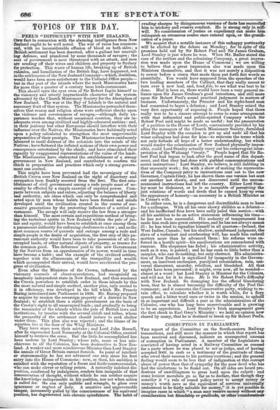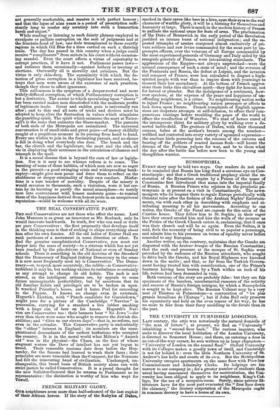CORRUPTION IN PARLIAMENT.
THE report of the Committee on the South-eastern Railway transactions, and still more the manner in which that report, has been received and discussed, indicate an unsuspected amount of corruption in Parliament. A member of the Legislature is convicted of having acted in a Railway Committee as counsel for a party where he was placed to act as judge, and of having accepted 3001. in cash as a testimony of the gratitude of those who owed their success to his partisan exertions ; and the general feeling would seem to be less that of indignation at this corrupt abuse of power than that of sympathy for the poor devil who has had the misfortune to be found out. On all sides are heard pro- fessions of unwillingness to press hard upon the culprit : and some lenient moralists go so far as to declare, that though they consider it "a rule of sound policy never to accept money or money's worth save as the equivalent of services universally understood to be fairly saleable for money," it is yet possible to imagine cases in which "a man may receive money without any consideration but friendship or gratitude, or other considerations
not generally marketable, and receive it with perfect honour ; and that the lapse of nine years is a period of prescription suffi- ciently long to render any scrutiny into such a transaction harsh and unjust." While reading or listening to such dainty phrases employed to exculpate or palliate corruption on the seat ofjudgment and at the fountain-head of law, one feels transplanted to those courtly regions in which Gil Bias for a time carried on such a thriving trade. The day has passed in this country when a judge could receive " compliments" from suitors in his court without occasion- ing scandal. Even the court affects a virtue of superiority to corrupt practices, if it have it not. Parliament passes laws— and enforces them occasionally—against bribery or treating at elections. Outwardly all is morality and primness. But the virtue is only skin-deep. The equanimity with which the de- tection of gross corruption in a legislator has been received, be- trays that men were aware of the existence of such practices, though they chose to affect ignorance.
This callousness is the symptom of a deeper-rooted and more widely-diffused corruption, of which Parliamentary corruption is but a derivative. The extent to which speculating upon "shares" has been carried makes men dissatisfied with the moderate profits of legitimate trade. Great and sudden gain is universally run after ; and to this end all sorts of tricks and devices must be adopted to keep alive the fluctuation in values which stimulates the gambling spirit. The spirit which animates the mart at Tatter- sall's is the same that animates the Share-market. The pursuits of both ends of the Metropolis are assimilated. The universal conversation is of small risks and great gains—of money skilfully caught at a propitious moment in its passing from hand to hand. Every one wishes to join in the fascinating pursuit, and no shame is felt in doing what everybody else does. The bench and the bar, the church and the legislature, the mart and the club, all vie in displaying their acuteness in the calculation of chances and triumph in the spoil.
It is a moral disease that is beyond the cure of law or legisla- tion. Nor is it easy to see whence reform is to come. The bursting of some of these bubbles, of which men are now so eager in the pursuit—a good swinging crisis and widespreading bank- ruptcy—might give men pause and force them to reflect on the shabbiness or deeper criminality of their own conduct. Misfor- tune is a rare teacher of morality. Despite of the misery it would occasion to thousands, such a visitation, were it but cer- tain by its bursting to purify the moral atmosphere—to terrify men into contentment with honest moderate gains—to remind them of the happiness derived from honest pride in an unequivocal reputation—would be welcome with all its woes.



























 Previous page
Previous page